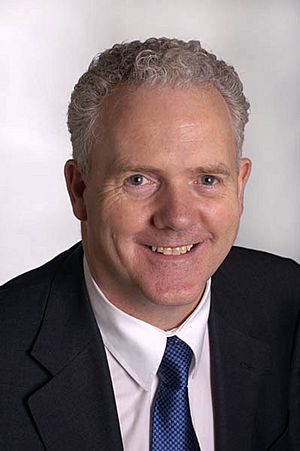Gerry McCormac facts for kids
Quick facts for kids
Sir Gerry McCormac
|
|
|---|---|
 |
|
| Principal and Vice-Chancellor of the University of Stirling |
|
| Assumed office 1 May 2010 |
|
| Preceded by | Christine Hallett |
| Personal details | |
| Born | 1 August 1958 Belfast, County Antrim, Northern Ireland |
| Spouse | Louise Gormley |
| Children | Three sons |
| Residences | Stirling, Scotland |
| Alma mater | Ulster Polytechnic (BSc, PhD) |
| Profession | Physicist, academic administrator |
| Salary | £295,000 (2021–22) |
| Website | https://www.stir.ac.uk/about/senior-officers-of-the-university/gerry-mccormac/ |
Sir Francis Gerard McCormac is a very important leader in education. He is the Principal and Vice-Chancellor of the University of Stirling in Scotland. Sir Gerry is a scientist who studies physics. He is an expert in space physics and a special way of finding out the age of old things called carbon dating. He was knighted in 2021 for his great work in education and helping the economy.
Contents
Early Life and Inspiration
Sir Gerry McCormac was born in Belfast, Northern Ireland, on August 1, 1958. He was the oldest of seven children. When he was in primary school, his teacher helped him discover his love for science. This inspiration led him to a career in scientific research and education.
A Career in Science and Education
Sir Gerry studied Physics and Geology at Ulster Polytechnic, finishing in 1980. He then earned his PhD in Physics in 1984. After that, he moved to the University of Michigan in the United States. There, he worked on a NASA satellite program called Dynamics Explorer.
Studying Space and Earth
At NASA, Sir Gerry used special tools to study Earth's atmosphere. He measured how fast winds moved high up in the atmosphere and how warm it was. This helped scientists understand how the sun's energy affects our planet.
Dating Ancient Discoveries
From 1990 to 2001, Sir Gerry worked at Queen's University Belfast. He led a team that used carbon dating to find the age of very old objects. This is a super important skill for archaeologists! He helped figure out the age of famous places and items, including:
- Stonehenge in England
- Ancient burial sites in Siberia called the Pazyryk burials
- Seahenge, an ancient wooden circle found near Sandringham
- The Dover Bronze Age Boat, a very old boat found in England
- Sutton Hoo, an important Anglo-Saxon burial site
- New Grange, an ancient monument in Ireland
Leading Universities and Businesses
Sir Gerry became a professor at Queen's University Belfast in 1998. He then became a Pro Vice-Chancellor, which means he helped manage the university's plans and finances. He also worked with businesses to help the economy grow in Northern Ireland. He was even the Vice-Chairman of Invest Northern Ireland, an organization that helps businesses.
In 2010, Sir Gerry became the Principal and Vice-Chancellor of the University of Stirling. This is a top leadership role where he guides the university. He also helped the Scottish Government review how teachers are employed. He continues to be a leader in higher education, working with groups like Universities Scotland and Universities UK. In 2017, he was chosen as a Fellow of the Royal Society of Edinburgh, which is a big honor for scientists and thinkers.
 | William L. Dawson |
 | W. E. B. Du Bois |
 | Harry Belafonte |

